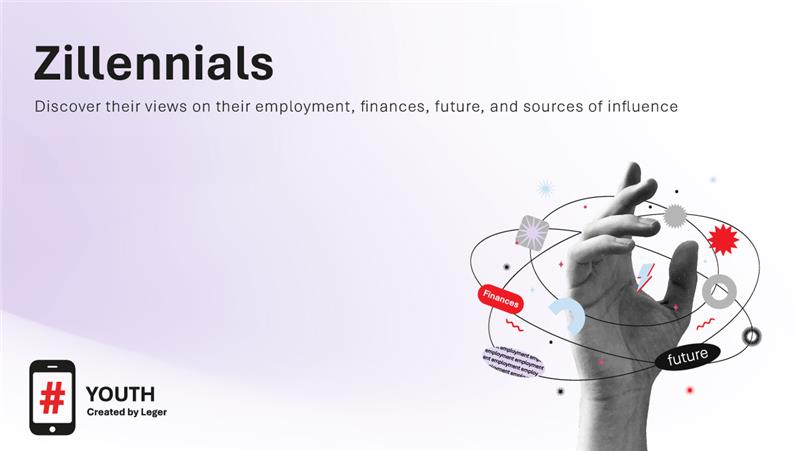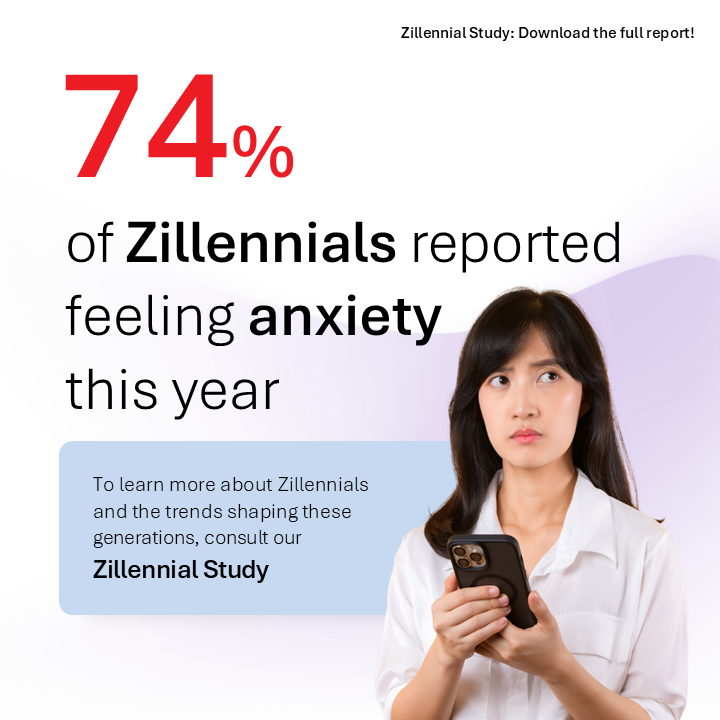Millennials and Gen Z continue to be at the forefront of the zeitgeist. While the repeated cultural debates of the appeal of skinny jeans and whether or not trad wives have it all are not without merit, brands and organisations need to go a bit deeper to better understand the consumers in these groups to more meaningfully engage with them.
And this is where Leger comes in. With its annual specialised study surveying Millennials and Gen Z (or as we call them, Zillennials), we delve deep into a variety of topics from finances, employment, and shopping behaviour and future aspirations. In particular, we cover trends in mental health and wellness, important topics for Zillennials as they tend to suffer from mental health challenges while at the same time being more open than previous generations about it.
In this blog, we offer a sneak peek into our data from this year’s survey of Zillennials. For more details on the study and our full report, visit our Youth Study page.
Anxiety not even an avocado toast can fix
According to our latest survey, three-quarters of young adults (74%) reported experiencing anxiety, while nearly half (48%) have dealt with depression. These numbers are consistent with last year where 78% say they experienced anxiety and 48% say they experienced depression. When we dive a little deeper, some subtle generational differences emerge (found in full report).
A TikTok Generation with Anxiety
Our study shows that a large portion of Zillennials experience depression (51% of Millennials and 44% of Gen Z).
Compared to last year, there was a slight decrease among Gen Z experiencing anxiety (74% this year vs 80% last year). The drop in anxiety levels among Gen Z may be due to the impact of social media content (particularly on TikTok) that aims to destigmatise mental health challenges and provide a safe space for support and advice for those going through it, but mental health remains a major challenge for Zillennials overall. However, mental health remains a major challenge for Zillennials overall.
With many Zillennials active online, they often feel pressured to gain acceptance from peers by carefully curating photographs and videos, fearful of online shaming (Source: The Guardian). Additionally, Zillennials are frequently exposed to global issues and negative news, further contributing to their anxiety and stress.
My parents had it easier: traditional financial goals seem out of reach
One possible cause of high levels of anxiety and depression is the economic landscape that young people face today. Indeed, the path to wealth and security, once much more attainable for previous generations, is increasingly challenging for today’s youth, with stagnating wages, relative to increasing costs of living: a majority (72%) of Zillennials feel that previous generations had a better chance at financial success, which is leading them to have less confidence in their current and future economic situation. Their confidence in their ability to surpass their parents’ wealth is gradually declining (-7 points compared to 2023), reflecting a certain pessimism.
Does Alcohol Consumption Play a Role in Zillennials’ Mental Health?
While older generations may view this demographic through a different lens, our recent findings reveal a shift in attitudes toward alcohol among younger generations, who increasingly associate their consumption choices with mental and physical well-being. Notably, 6 out of 10 Zillennials (61%) reported that they’ve reduced or completely stopped drinking alcohol, or never consumed alcohol.
Sober Curiosity: Reducing Alcohol Consumption
Among those cutting back or quitting, health and wellness are the primary motivators, with 39% citing their physical health as the main reason. Financial reasons also play a significant role, with 36% aiming to reduce or eliminate expenses, while 33% believe cutting back improves their quality of life and helps them feel better about themselves. Additionally, 29% of Zillennials cited mental health as a key factor in their decision to reduce or quit alcohol consumption.
This trend toward mindful drinking, also known as “sober curiosity,” reflects a growing movement among young adults toward healthier lifestyle choices.
Our Sober Curious Study, led and conducted by our team based in the U.S., confirms this ever-growing movement, which is gaining traction. This conscious choice to drink less, or not at all, suggests a shift in priorities, where mental clarity and emotional stability take more ground.
So What do Zillennials Consume?
Among those who reduce or quit alcohol, many are exploring alternative products that align with their wellness goals. In fact, nearly one-third (31%) of them report consuming products with 0.5% alcohol or less. This shift reflects a move toward beverages that offer a similar social experience to alcohol without the intoxicating effects.
Cannabis and cannabis-derived products are also popular choices, with 23% of Zillennials opting for these alternatives. Additionally, 11% have turned to other substances, such as narcotics. Among Zillennials, Gen Z stands out for its higher consumption of these alternatives compared to Millennials, showing a generational shift in preferences.
Conclusion
These insights are invaluable for understanding how young people are navigating their lives in a rapidly evolving world.
To dive even deeper into Zillennials’ perspectives on finances, employment, future aspirations, and more, be sure to check out our full report—not only does it help brands connect meaningfully with young consumers, but it also sheds light on the priorities and trends driven by these growing generations.
To download the full report on the Zillennials’ study, please consult our Zillenial Study.





